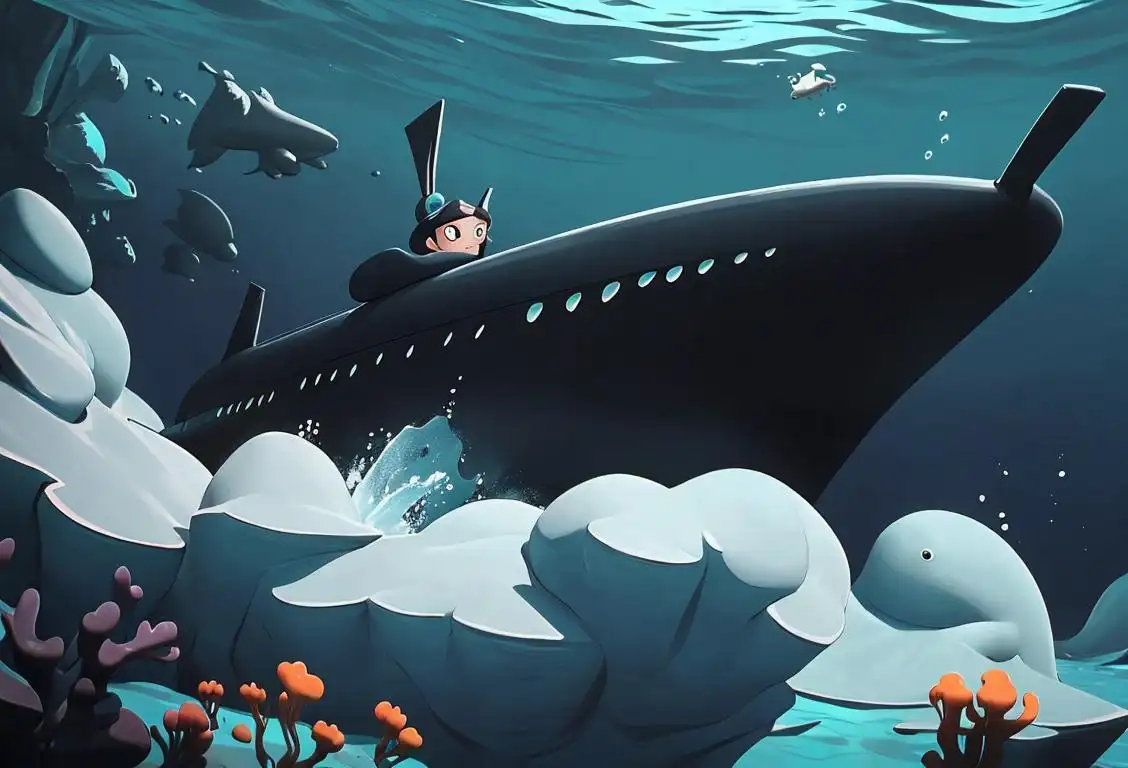National Submarine Day

Ahoy there, mateys! It's time to dive deep into National Submarine Day. This special day celebrates the incredible ingenuity and bravery of those who explore the vast depths of the ocean in these amazing vessels. So, grab your diving gear and get ready for an underwater adventure like no other!
When is Submarine Day?
It's national submarine day on the 11th April.
The Incredible History of Submarines
Did you know that submarines have been around for centuries? It's true! While the modern submarines we know today are a result of advanced technology and engineering, the concept of underwater vessels dates back to ancient times. The first documented submarine design was created by an inventive fellow named Cornelius Drebbel in 1620. His wooden vessel, known as the Drebbel submarine, used oars for propulsion and had glass windows to provide a view of the underwater world.
Fast forward a few hundred years, and we find ourselves in the midst of World War I, a time when submarines played a crucial role in naval warfare. These underwater warriors known as U-boats were used by both sides, wreaking havoc in the deep seas. But it wasn't until World War II that submarines truly came into their own. The advancements in technology allowed for longer underwater missions, stealthy maneuvers, and devastating firepower.
Today, submarines continue to play a vital role in our military, as well as in scientific research and exploration. They allow us to uncover the mysteries of the deep sea, study marine life, and even search for sunken treasures. It's a world beneath the waves that captivates our imagination and reminds us of the vastness and beauty of our oceans.
Celebrating National Submarine Day
On National Submarine Day, it's time to pay tribute to those brave souls who take to the depths of the ocean. Here are a few ways you can celebrate:
- Watch a submarine-themed movie or documentary. From classics like "The Hunt for Red October" to modern gems like "Das Boot," there are plenty of films that highlight the excitement and challenges of submarine life.
- Get in touch with your adventurous side and go scuba diving. While scuba diving is not quite the same as exploring in a submarine, it will give you a taste of what it's like to be underwater.
- Take some time to appreciate the beauty of our oceans. Whether you visit a local aquarium or simply spend some time by the shore, let the vastness and wonder of the sea inspire you.
Did You Know?
Did you know that the longest recorded submerged time for a submarine is 111 days? Talk about staying underwater for an extended vacation! This impressive record was set by the British submarine HMS Warspite during the Falklands War in 1982. That's a lot of time spent with fishy neighbors!
History behind the term 'Submarine'
1578
The Early Concept
The term 'submarine' finds its roots in 1578 when the first recorded concept of an underwater craft was described by William Bourne. In his book 'Inventions or Devices', Bourne proposed a vessel that could operate underwater and attack enemy ships without being detected. However, this early concept did not refer to the craft as a 'submarine' specifically.
1620
The 'Submarine' Term Emerges
Nearly half a century later, in 1620, the term 'submarine' was first used in English. Sir Cornelius Drebbel, a Dutch inventor in the service of the English Royal Navy, built a wooden submarine called the 'Drebbel' to assist Charles I in his war against Spain. The vessel was referred to as a 'submarine' in writings from the time, marking the earliest known usage of the term.
1776
The Turtle
During the American Revolutionary War in 1776, David Bushnell, an American inventor, built a more sophisticated hand-powered submarine called the 'Turtle'. The Turtle was used in an attempt to attach explosive charges to British warships in New York Harbor. Though not highly successful in its mission, the Turtle represents an important step in submarine development and the advancements in underwater warfare.
1800
Robert Fulton's 'Nautilus'
In 1800, Robert Fulton, an American engineer and inventor, designed a submarine known as the 'Nautilus'. The Nautilus was the first practical submarine to be used in combat, successfully attacking a ship during a demonstration. This marked a significant advancement in underwater warfare capabilities and reinforced the importance of submarines in naval operations.
1870
Jules Verne's 'Twenty Thousand Leagues Under the Sea'
In 1870, Jules Verne, a French author, published his famous science fiction novel 'Twenty Thousand Leagues Under the Sea', which captured the imagination of readers worldwide. The book popularized the idea of submarines and brought the concept to a wider audience, influencing public perception and generating interest in the potential of underwater exploration.
1900
First Operational Submarine Fleet
The year 1900 saw the establishment of the first operational submarine fleet by the Royal Navy, consisting of five vessels. This marked a significant milestone in naval history as submarines became recognized as a vital component of modern warfare. The increased adoption of submarines by various navies around the world led to further technological advancements in submarine design and propulsion.
1950
Nuclear-powered Submarines
The 1950s saw the introduction of nuclear-powered submarines, which revolutionized underwater operations. The USS Nautilus, commissioned in 1954, was the world's first operational nuclear-powered submarine. Nuclear propulsion provided submarines with increased speed, endurance, and the ability to remain submerged for extended periods. This development transformed submarine capabilities and led to significant advancements in underwater exploration and military strategy.
2022
Modern Submarine Technology
In the present day, submarines are equipped with state-of-the-art technology and serve a variety of purposes, including military operations, scientific research, and underwater exploration. Advances in propulsion, stealth technology, navigation systems, and weaponry have made submarines incredibly sophisticated vehicles capable of operating effectively in various conditions and depths.
Did you know?
Did you know that the longest recorded submerged time for a submarine is 111 days?Tagged
awareness fun historyFirst identified
11th April 2015Most mentioned on
11th April 2015Total mentions
437Other days
Purple Heart Day
Bourbon Day
Teacher Appreciation Day
Random Acts Of Kindness Day
Former Prisoner Of War Recognition Day
Vodka Day
Memorial Day
Liberation Day
Convention Day
Flag Of Canada Day









